“We’re not grown-ups. We’re growing up”: The daunting privilege of raising godly children
by Gracia Chiang // July 22, 2024, 4:53 pm

When parents realise that they need as much growing up as their children, this allows the beauty of the gospel to be seen in their family, said Our Daily Bread (ODB) Singapore's Bible Conference 2024 speaker Lim Chien Chong. All photos courtesy of ODB.
Those of us with children realise that we have been blessed with a sacred responsibility as parents. And yet, the sheer weight of this responsibility is also what scares us.
Addressing this fear squarely, Our Daily Bread Ministries’ recent Bible Conference was titled The Daunting Privilege: Reaching Children with the Gospel.
Held on July 13 at Bartley Christian Church, Singapore Youth for Christ‘s (SYFC) Teaching & Resource Director, Lim Chien Chong, encouraged participants with principles from the Word of God as well as practical handles from his parenting journey.
The key takeaway was this: As we seek to bring our children up in the Lord, we ourselves need to be growing in our walk with Jesus.
“Another way of saying this is: We can’t raise our children in the Lord if we ourselves are not growing in the Lord,” he clarified.
Remembering our privilege as God’s children
Using the Book of Ephesians to draw lessons on parenting, the former National Director of SYFC shared this main idea:
The privilege of raising our children is an outworking of our privilege of being God’s children ourselves.
Observing how we sometimes underrate our own Christian faith, Chien Chong outlined four ways in which this privilege is life-changing.
1. We are blessed with every spiritual blessing in Christ
“It’s dangerous when we equate our faith to just about having material success,” said Chien Chong, reminding parents that the privilege of being God’s children goes way beyond physical blessings (Ephesians 1:3).
Illustrating this with a real-world example, the father of two teens explained that if our children were asked “What is the best thing about your family?” and they answered “free food and free lodging”, we would be very disappointed.
“That’s it?” he questioned. “What about all the family relationships and all that?”
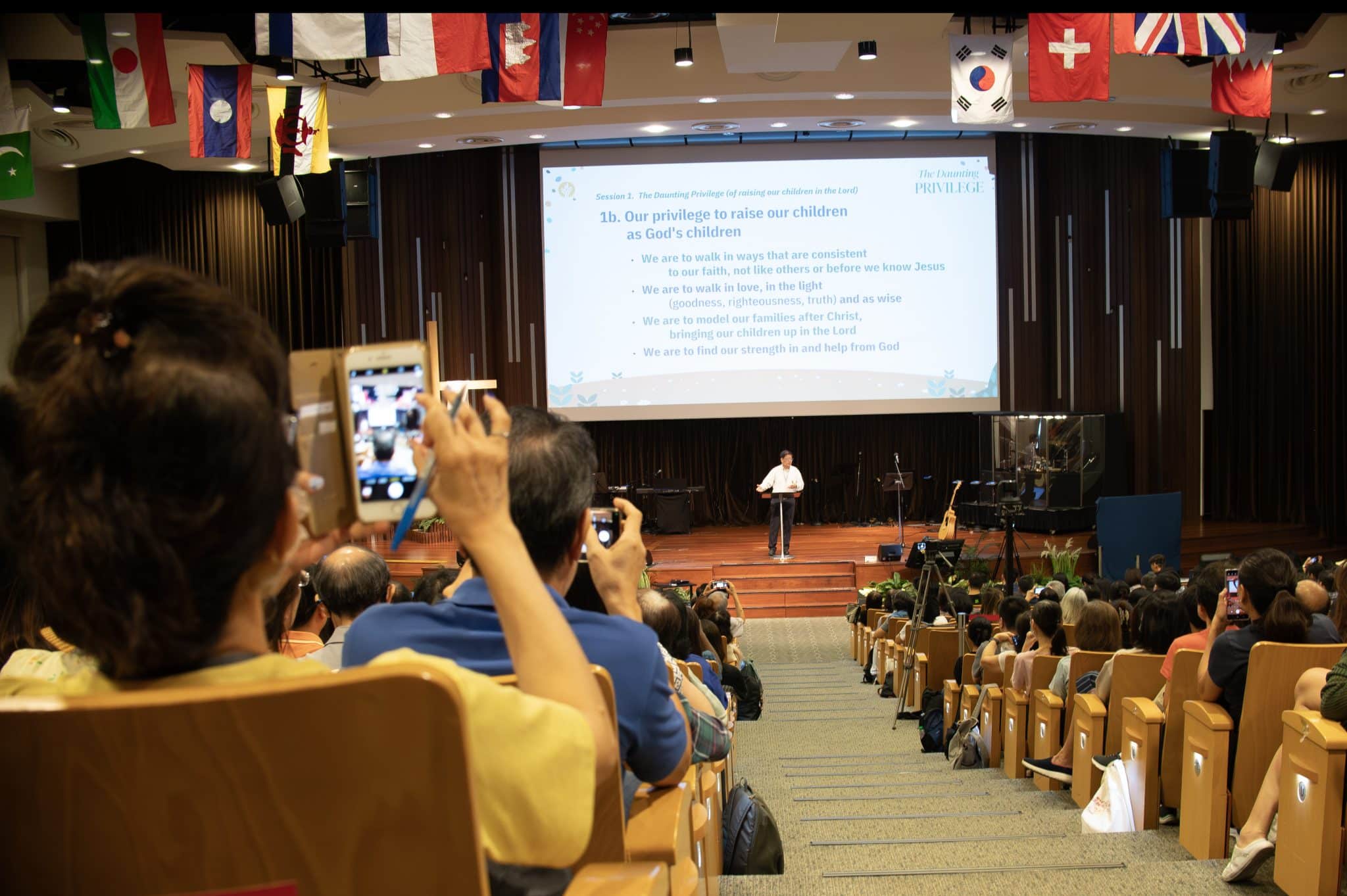
If parents themselves have not experienced the joy of being in a close relationship with God, then it would be hard to share this with their children, said Chien Chong.
We must begin with a deep sense of privilege that comes from our relationship with God, urged Chien Chong.
“When we become God’s children, the Father adopts us, the Son redeems us and the Spirit seals us.
“Then as we enjoy this privilege, we want to bring our children along to enjoy this same joy and privilege that we have.”
2. We have been made new
One of the big blessings that comes from this privilege is the “massive transformation” that we can experience as God’s children, he noted.
In Ephesians 2:1-10, Paul describes what we once were. But because of Jesus Christ’s saving work, we have been made anew – both in who we are and how we live.
The implications are plenty, explained Chien Chong. For one, we may not have had great childhood experiences, but we do not need to be trapped by them.
“In Christ, as we continue to grow, we continue to be God’s workmanship, being renewed day by day,” he said.
In other words, we do not have to be limited or hindered by our past. There is hope for better days.
3. We are now part of a new community
The third privilege is that as God’s children, we are now part of a bigger family, with Jesus as our cornerstone (Ephesians 2:19-20).
“The good news is: Parents, you’re not on your own,” said Chien Chong.
“The church is not a service provider… The church is not the place that we send our children for enrichment programmes.
“The church is the community that we are a part of, where we can grow together.”
While some of us might be more private people and feel like we want to manage on our own, “God knows that we need one another more than we can imagine”, he added.
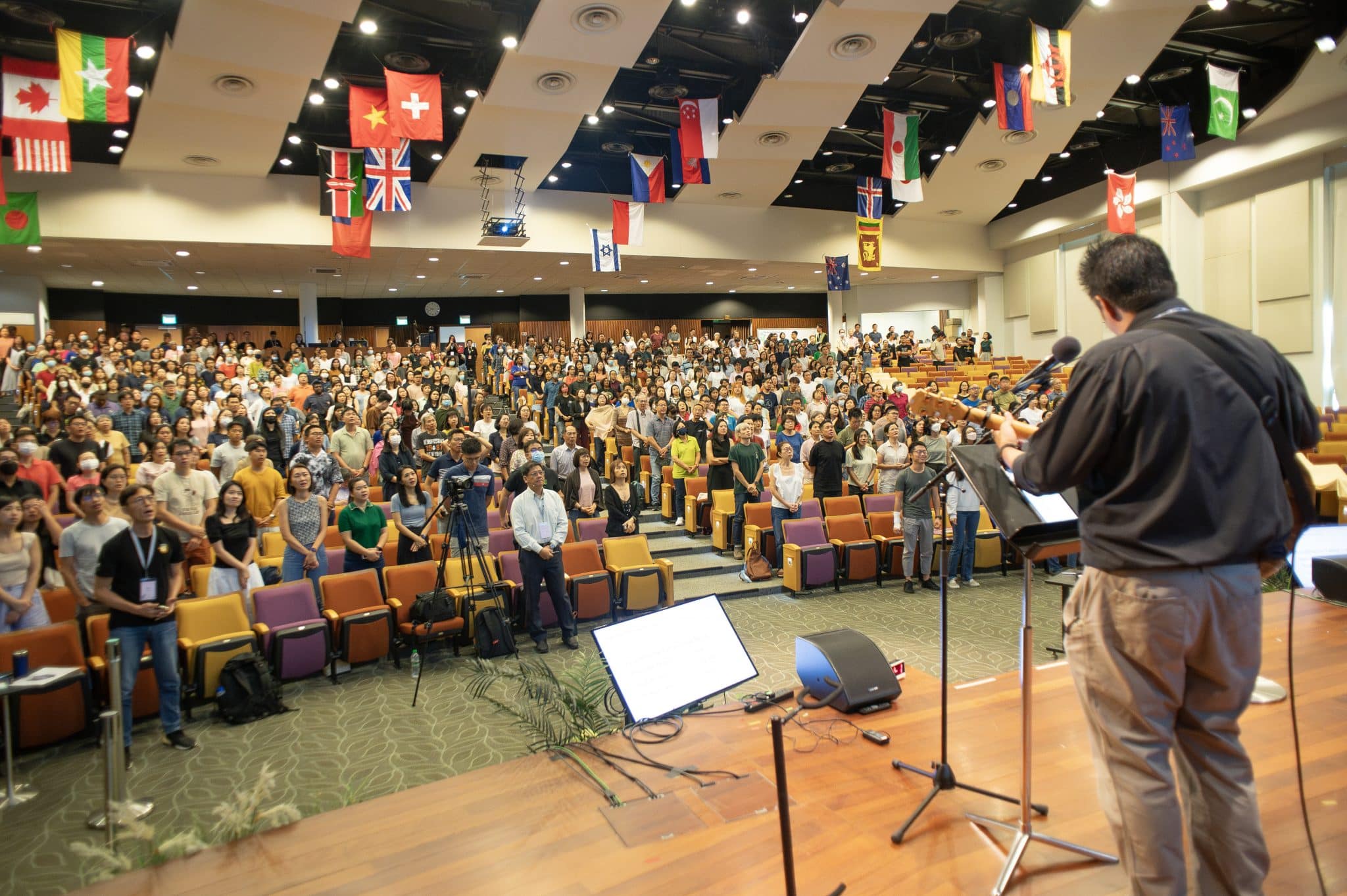
Chien Chong encouraged parents to lean on the support system that churches can offer.
4. We have a new understanding, orientation and empowerment through His Spirit
The Bible also tells us that we have new power to live (Ephesians 3:14-21). “We’re always on growth mode,” said Chien Chong.
The application for parents is that they do not need to get everything sorted out before starting their journey.
“Even as we fumble and find ourselves sometimes struggling, not knowing the answers, it’s part of the journey,” shared Chien Chong.
“Then you will feel that, ‘Ya, I really need to pray that God will empower me and enable me.'”
“As we grow in our journey with God, we are then able to grow with our children.”
Wrapping up this first segment on privilege, Chien Chong reiterated: “It’s very clear that our primary relationship is between ourselves and God.”
While our family relationships are very important, even these are secondary to our relationship with God.
“So as we grow in our journey with God, we are then able to grow with our children,” he summarised.
How can parents raise children in the Lord?
Turning to the second half of Ephesians, Chien Chong then extracted a few principles for parents on how they can relate to their children.
1. Walk in a way that is consistent to our faith
In the same way that Paul exhorted the Ephesian church to “walk in a manner worthy of the calling” they have received, Chien Chong urged parents to be careful in their conduct.
This means not living the way we did before we knew Jesus, or in the same manner as those who are not of the faith.
Sharing from his experience of talking to young people, he said: “They struggle with the parents saying one thing, but doing something else.”
“And it makes them wonder: All the things that we say and all the things they hear in church – are they for real?”
Reminding parents to be careful about the verbal and non-verbal messages they are sending to their kids, Chien Chong said: “It’s very important that we constantly work towards consistency of what it means to be God’s children.”

At the Q&A session, Chien Chong and mother of three Sophia Huang (centre) suggested practical ways that parents can live out the gospel in family life.
The other danger is worldliness. For instance, are we measuring them by their character or their achievement?
While parents today have no shortage of tips thanks to the internet, Chien Chong pointed out that “every advice and resource has a context and makes some assumptions”.
Since these might come from those who have different beliefs and values, parents will need to weigh and filter whatever they learn based on what it means to raise their children in the Lord.
2. Live in love, light and wisdom
Highlighting Christ’s sacrificial love as an example (Ephesians 5:1), Chien Chong explained that the Bible also calls us as children of light to walk in goodness, righteousness and truth (Ephesians 5:8-9).
In addition, we should live not as unwise but wise (Ephesians 5:15-16).
“These are the things that I constantly think about,” he revealed.
“Is it a loving thing to do? Is it the right thing, a good thing? And is it something that is true to Scripture? Is it a wise thing to do?”
Whether it is making decisions on the issue of screen time or managing tantrums, there is no quick answer, said Chien Chong.
Instead, he advises listening to your spouse and children, thinking through the above questions and then working it out as a family.
3. Model what a godly family looks like
Referring to Paul’s instructions in Ephesians 5:21-33 for Christian households, Chien Chong suggested: “The best gift I can give to my kids is: First, to impart our Christian faith. Second, to show them what a Christian family is like.”
In that way, when our children grow up to be parents themselves, they would at least have had a reference.
Encouraging husbands and wives to work on their relationship too, Chien Chong noticed that often the struggles parents have with their children could reflect issues that are unresolved between spouses.
“It’s only when you can sort that out then you can stand together as a team to relate with your children,” he said.
4. Find our strength in God
Finally, just like Paul encouraged the church to be strong in the Lord (Ephesians 6:10-20), we too can find our source of strength in God.
Admitting that he was initially hesitant about speaking at a parenting conference because of his own weaknesses, Chien Chong confessed: “There are so many areas (my wife and I) need to work through. But if it’s of any encouragement to you, we draw strength from God.”
“We have the Lord to help us and enable us.”
Underscoring the importance of prayer too, he added: “You can’t be watching your children 24/7. But you cannot don’t watch them right?
“So we pray lah. Because there’s only so much we can do right?”
Parenting is a journey that God takes each one of us on, so we must turn to Him for strength, said Chien Chong.
“We have the Lord to help us and enable us,” he emphasised.
Sharing the gospel with children
In his last segment, Chien Chong ended by introducing practical ways that parents can bring the gospel to their children.
While living out the gospel is important, Scripture tells us that our children also need to hear the gospel, he stressed.
“How, then, can they call on the one they have not believed in? And how can they believe in the one of whom they have not heard? And how can they hear without someone preaching to them?” (Romans 10:14)
“If our children were to come to know Jesus, they need to hear an explanation about Jesus,” said Chien Chong.
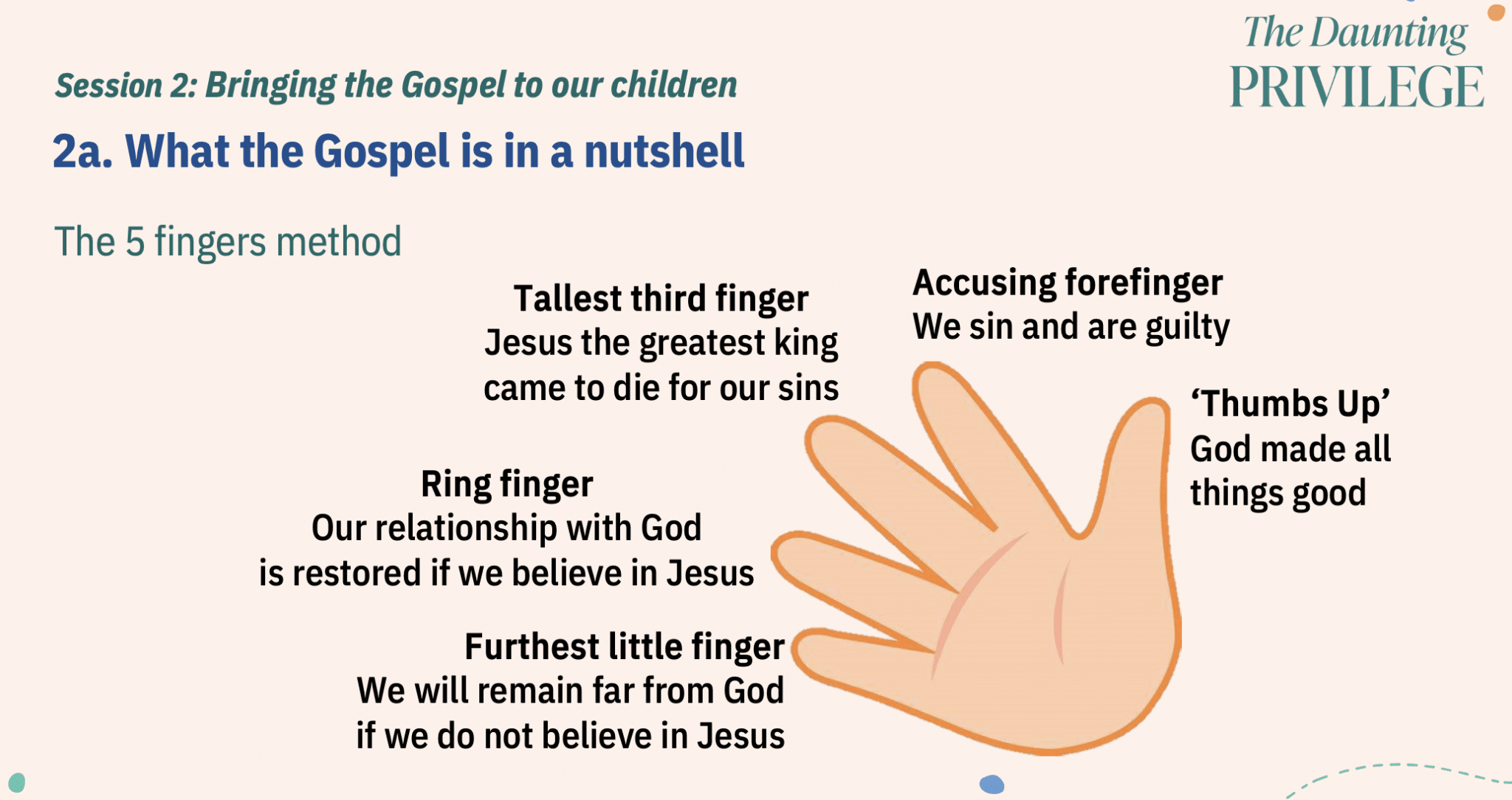
One of the tools that Chien Chong finds helpful for young children is the 5 Fingers Method.
These are four tools that parents can consider.
- Wordless Book
- 5 Fingers Method (pictured)
- Bridge to Life
- Two Ways to Live
After our children know the essence of the gospel, it is then the role of parents to reinforce this at home, added Chien Chong.
1. Relate family experiences to what Jesus has taught and done
Sharing an example, Chien Chong said there was a time when his younger son came home with a $10 note that was broken into pieces while playing with a friend.
While Chien Chong’s tendency would have been to reprimand his son, that day he held back.
“You take this in replacement for that,” recounted Chien Chong, handing a new $10 note to his boy.
“He looked at me and said, ‘For real? Why would you do that?'”
Using this as a teachable moment, Chien Chong replied: “This $10 is very well spent if you always remember that we live valueless lives, but because Jesus came in exchange for our lives, we can live valuable lives.”
“Don’t leave all this ‘Jesus thing’ in church,” he challenged parents. “We want to try to internalise whatever we have learnt in church even in our daily lives.”
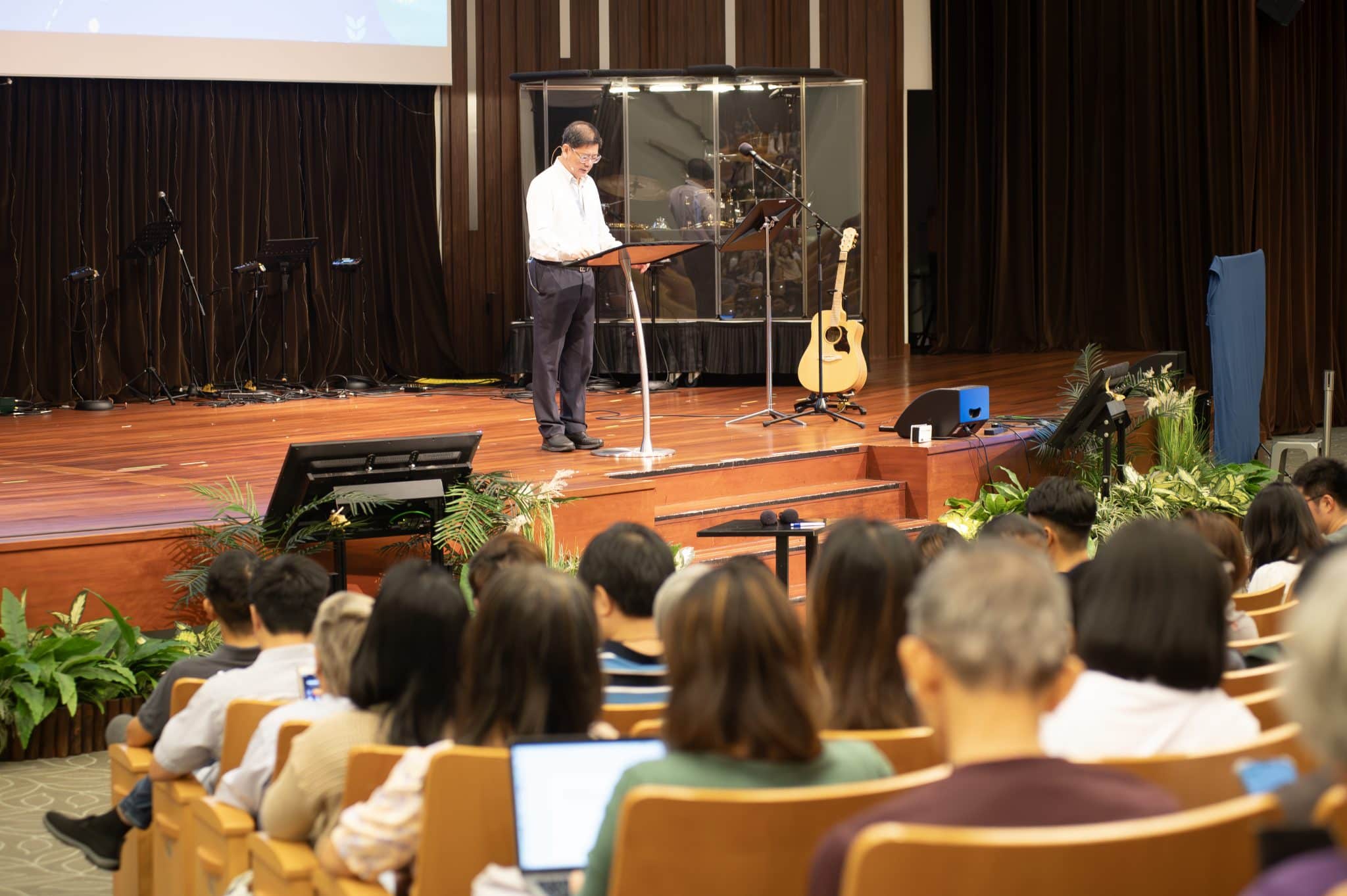
Even when parents mess up, they can still grow through their mistakes, said Chien Chong.
2. Grow in the gospel ourselves
Instead of just telling our children who God is, show them who He is.
“If God is love, can I display some aspects of God’s love? If God is righteous, can I display some aspects of what it means to be righteous?” asked Chien Chong.
On the flip side, he mentioned that parents must also realise that they need the gospel in their own lives.
“Our children must see that we do recognise our flaws. We also need Jesus for forgiveness,” explained Chien Chong. “And when we come to the Lord Jesus for forgiveness, we also ask them for forgiveness.”
Disclosing that he has no qualms about apologising to his children, Chien Chong believes that authenticity is crucial in parenting.
“It’s not as though, ‘You guys need growing up to do. Dad and Mum, we’re grown-ups,'” he remarked.
“The earlier we realise we need as much growing up as our children, the earlier the beauty of the gospel would then be seen in our family.”
Reaffirming parents to continuing growing in the Lord, Chien Chong concluded: “Don’t just grow our children. Grow with our children.
“We’re not grown-ups per se. We’re growing up.”
A new resource for kids
Our Daily Bread Ministries Singapore has launched a new initiative called The Gospel Before 6.
Introducing its first picture book at the Bible Conference 2024, the goal is to help parents, churches and Christian organisations share the Good News with children.
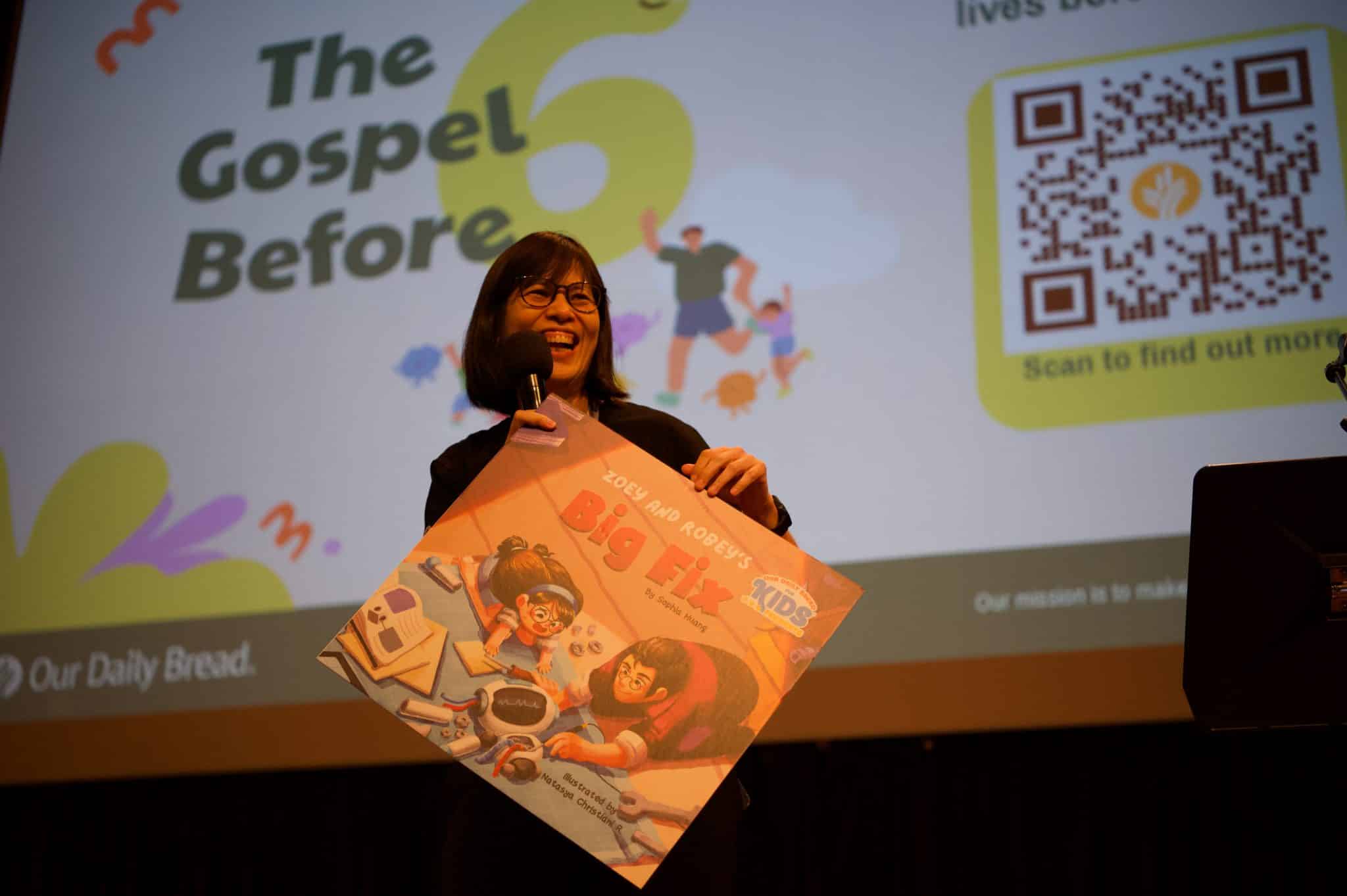
Chia Poh Fang, Executive Director of Our Daily Bread Singapore, shared about the ministry’s desire to sow the seed of the gospel in children before they start primary school.
Written by children’s book author and mum of three, Sophia Huang, Zoey and Robey’s Big Fix contains an AI-inspired storyline that is designed to open up conversations on the gospel. There is also an audio version of the book.
Four more titles are in the works, as are translated versions of the first book.
If you would like a copy of the book or want to learn how you can support this project, do visit The Gospel Before 6.
RELATED STORIES:
I learnt how to be a dad from my father, my spiritual fathers and my heavenly Father
We are an independent, non-profit organisation that relies on the generosity of our readers, such as yourself, to continue serving the kingdom. Every dollar donated goes directly back into our editorial coverage.
Would you consider partnering with us in our kingdom work by supporting us financially, either as a one-off donation, or a recurring pledge?
Support Salt&Light


